HASS(Humanities and Social Science)Program
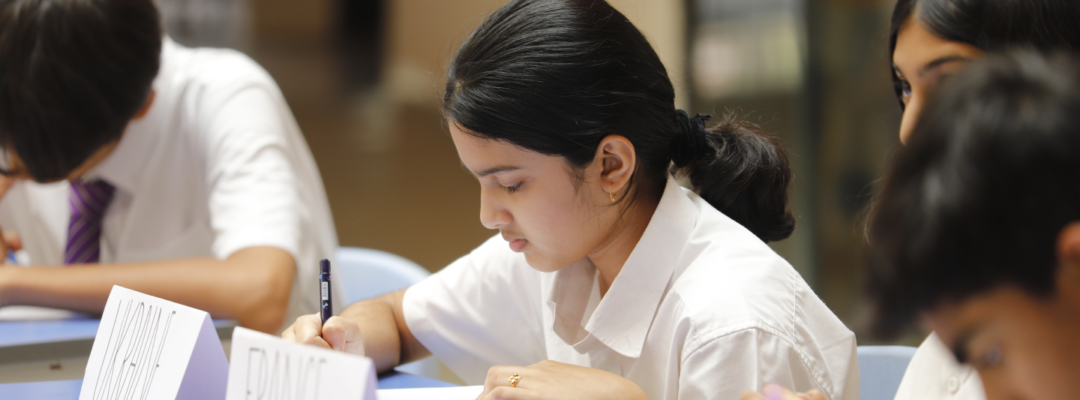
Unlocking a World of Opportunities: Discover the Humanities & Social Science Program at Ekya
Learning Area Purpose
The purpose of learning Social Science is to enable learners to:

Develop a deeper understanding of society, law, politics and human-environment interactions.
Critically think about issues and perspectives by recognising the different social, historical and legal contexts.
Make informed and reasoned decisions for the public good.
Social Science (Grades 1-10): The Social Science program focuses on social science knowledge and understanding which are essential for informed citizenship and participation in a democratic society. The curriculum helps students build skills Like critical thinking and problem-solving skills. The curriculum is planned to promote cultural understanding and respect in order to appreciate the diversity of human experience.
- Economics (Grades 11-12): Economics, the study of production, distribution, and consumption of goods and services, provides students with the tools to analyse and understand the economic forces that shape our world. We explore concepts such as market structures, economic systems, globalisation, and international trade, equipping students with the knowledge to navigate the complexities of the modern Economy.
- Political Science (Grades 11-12): Political Science delves into the intricacies of power, governance, and political systems. We examine the foundations of democracy, the role of government institutions, and the dynamics of international relations. Through this exploration, students gain insights into the political landscape and develop the critical thinking skills necessary to engage in informed political discourse.
Psychology(Grades 11-12): Psychology, the study of the human mind and behaviour provides students with a fascinating glimpse into the complexities of human thought, emotions, and motivations. We explore topics such as cognitive processes, social behaviour, personality development, and mental health, empowering students to understand themselves and others better.
Legal Studies (Grades 11-12): Legal Studies introduces students to the principles of law, the legal system, and the role of law in society. We examine concepts such as constitutional law, criminal law, civil law, and international law, fostering an understanding of the legal framework that governs our world.

At Ekya Schools, we believe that social science education is not merely an academic pursuit; it is a vital foundation for responsible citizenship and effective participation in a democratic society. Our comprehensive Humanities and Social Science program encompasses a range of disciplines, including Economics, Political Science, Psychology, and Legal Studies, each offering unique perspectives on the complexities of human societies and the world we inhabit.
Real-World Learning Through Research
Ekya students engage in interdisciplinary research projects that connect classroom learning to practical and ethical issues in their communities and the world.

- Investigating the role of power and governance in shaping societies
- Applying theoretical frameworks to real-world case studies in Ekya’s social science curriculum
- Understanding socio-political realities through Ekya’s conceptual-based learning.
- Developing research skills to analyse historical events and cultural practices.
- Exploring geographical contexts and their impact on social structures.
Social Science (Grades 1-10)
The Social Science program focuses on social science knowledge and understanding, which are essential for informed citizenship and participation in a democratic society. The curriculum helps students build skills like critical thinking and problem-solving skills. The curriculum is planned to promote cultural understanding and respect in order to appreciate the diversity of human experience.
Economics (Grades 11-12)
Economics, the study of production, distribution, and consumption of goods and services, provides students with the tools to analyse and understand the economic forces that shape our world. We explore concepts such as market structures, economic systems, globalisation, and international trade, equipping students with the knowledge to navigate the complexities of the modern economy.
Political Science (Grades 11-12)
Political Science delves into the intricacies of power, governance, and political systems. We examine the foundations of democracy, the role of government institutions, and the dynamics of international relations. Through this exploration, students gain insights into the political landscape and develop the critical thinking skills necessary to engage in informed political discourse.
Psychology (Grades 11-12)
Psychology, the study of the human mind and behaviour, provides students with a fascinating glimpse into the complexities of human thought, emotions, and motivations. We explore topics such as cognitive processes, social behaviour, personality development, and mental health, empowering students to understand themselves and others better.
Legal Studies (Grades 11-12)
Legal Studies introduces students to the principles of law, the legal system, and the role of law in society. We examine concepts such as constitutional law, criminal law, civil law, and international law, fostering an understanding of the legal framework that governs our world.

Real-World Learning Through Research
Ekya students engage in interdisciplinary research projects that connect classroom learning to practical and ethical issues in their communities and the world.
Understanding socio-political realities through Ekya’s conceptual-based learning
Developing research skills to analyse historical events and cultural practices
Exploring geographical contexts and their impact on social structures
Investigating the role of power and governance in shaping societies
Applying theoretical frameworks to real-world case studies in Ekya’s social science curriculum
Activity-Based Learning
At Ekya, our social science curriculum is designed to be engaging and interactive, focusing on activity-based learning. Through hands-on experiences and real-world applications, students develop a deeper understanding of social science concepts.

- Develops critical thinking and problem-solving skills through hands-on experiences
- Enhances understanding of social science concepts through experiential learning
- Meaningful activities facilitate exploration of geographical, historical, and cultural concepts
- Integrated themes and cross-cutting concepts foster connections between concepts, periods, and geographies
- Encourages adaptability and creativity through interactive learning experiences
- Integrated themes and cross-cutting concepts foster connections between concepts, periods, and geographies
- Encourages adaptability and creativity through interactive learning experiences
Activity-Based Learning

At Ekya, our social science curriculum is designed to be engaging and interactive, focusing on activity-based learning. Through hands-on experiences and real-world applications, students develop a deeper understanding of social science concepts.
Develops critical thinking and problem-solving skills through hands-on experiences
Enhances understanding of social science concepts through experiential learning
Meaningful activities facilitate exploration of geographical, historical, and cultural concepts
Integrated themes and cross-cutting concepts foster connections between concepts, periods, and geographies
Encourages adaptability and creativity through interactive learning experiences
Civic Action and Engagement
Ekya focuses on educating young minds and turning them into responsible citizens. The social science curriculum is heavily based on studying interaction and human behaviour in social, cultural, environmental, economic and political contexts.

- Engaging in community and societal contributions through meaningful activities
- Our students examine complex social, economic, and political challenges
- Understanding the democratic process through experiential learning
- Making informed decisions for the public good through critical thinking and problem-solving

Civic Action and Engagement
Ekya focuses on educating young minds and turning them into responsible citizens. The social science curriculum is heavily based on studying interaction and human behaviour in social, cultural, environmental, economic and political contexts.
Understanding the democratic process through experiential learning
Making informed decisions for the public good through critical thinking and problem-solving
Engaging in community and societal contributions through meaningful activities
Our students examine complex social, economic, and political challenges
Social Science Tools in the Classroom
Ekya’s social science curriculum combines hands-on experiences and real-world applications to foster a deeper understanding of concepts, making learning engaging and interactive for students through activity-based learning.

- Socratic Seminars: A method of teaching based on Socratic questioning, where students engage in deep, reflective discussions about a text or topic.
- Gallery Walks: Students create visual displays of their research or projects and walk around the classroom to view and discuss each other’s work.
- See Think Wonder: A thinking routine where students observe an image or artefact, describe what they see, think about what it means, and wonder about its implications.
- Round Table Discussions: Small group discussions where each participant has an equal opportunity to contribute, moderated to ensure focused and inclusive dialogue.
Social Science Tools in the Classroom

Ekya’s social science curriculum combines hands-on experiences and real-world applications to foster a deeper understanding of concepts, making learning engaging and interactive for students through activity-based learning.
Socratic Seminars: A method of teaching based on Socratic questioning, where students engage in deep, reflective discussions about a text or topic.
Gallery Walks: Students create visual displays of their research or projects and walk around the classroom to view and discuss each other’s work.
See Think Wonder: A thinking routine where students observe an image or artefact, describe what they see, think about what it means, and wonder about its implications.
Round Table Discussions: Small group discussions where each participant has an equal opportunity to contribute, moderated to ensure focused and inclusive dialogue.
Blogs
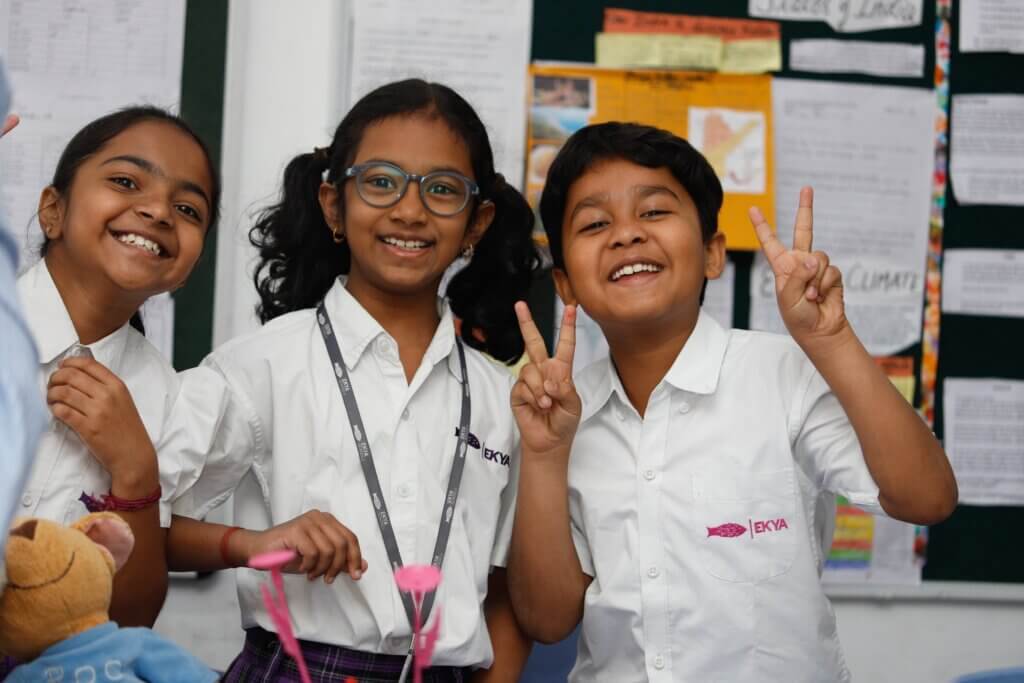
A Proven Framework for Success The ICSE curriculum at Ekya Schools represents more than an academic program – it’s a […]
Read moreLanguages Offered
| Category | Languages | Grades |
|---|---|---|
| First Language | English | Grades 1-12 |
| Second Languages | Kannada, Hindi, French | Grades 1-10 (French from Grades 5 & 6) |
| Third Languages | Kannada, Hindi, French | Grades 5-8 |
Learning Area Purpose
The Language program equips learners to:
- Make meaning of the language
- Understand a variety of texts and develop an informed appreciation for literature
- Communicate effectively and creatively, according to the medium and the audience
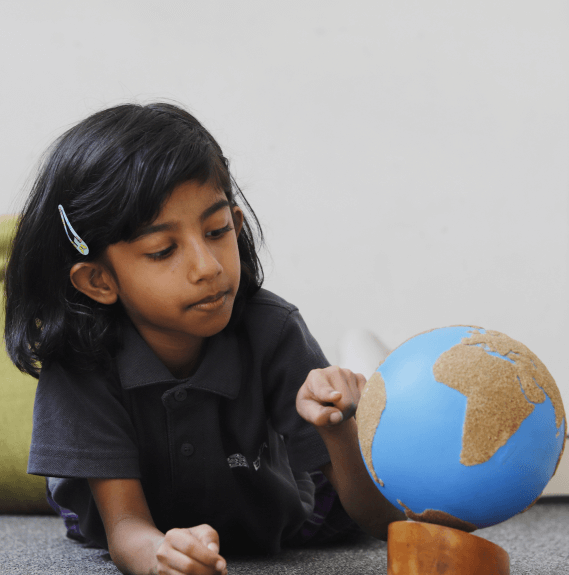
Key Learning Experiences
Love to Read Program
Ekya’s ‘Love to Read Program’ encourages students to explore new genres, authors, and stories, developing essential skills and fostering a lifelong love for reading. The program includes experiences such as –

- Author Talks: Our students engage with and draw inspiration from popular Authors
- Guided Levelled Reading Program: Implement a program to support all readers and their diverse reading abilities.
- Literary Circle: Foster literary engagement through the School’s Literary Circle.
- School Book Club: Participate in the School Book Club.
- Reading Initiatives: Introduce initiatives like Drop Everything And Read (DEAR) time, Reading Week, and Read-aloud events to promote reading.
- Ekya Publications: Curate and showcase student work through Ekya Publications.
- Creating Literature: Create literature to empower students to become confident writers.
Immersion into Fiction, Nonfiction, and Poetry
Ekya, through our language program, students will delve into diverse genres of books. Each student is distinct, so we encourage them to explore various genres and discover their ideal fit.

- Inclusion of Indian Authors: Award-winning Indian authors’ works are featured in contemporary Indian settings.
- Building Empathy: Diverse book titles help build empathy and understanding among students.
- Overview of the Book Plan: A plan designed based on international benchmarks and standards prepares students for various language uses.
- Grade-Specific reference books: Grade-specific books, such as ‘Sunita Williams- A Star in Space’ by Aravinda Anantharaman for Grade 5, are provided.
- Books About Books: Early grades start the year with stories that celebrate books and libraries, fostering a love for reading from a young age.
- Summer Reading Program- A structured summer reading program encourages children to read during school breaks.
Writing Process
The writing process is a significant part of the language program where all writing is treated as a creative act which requires time and positive feedback. Students use feedback to modify their work and have to return to the prewriting step to develop and expand their ideas.
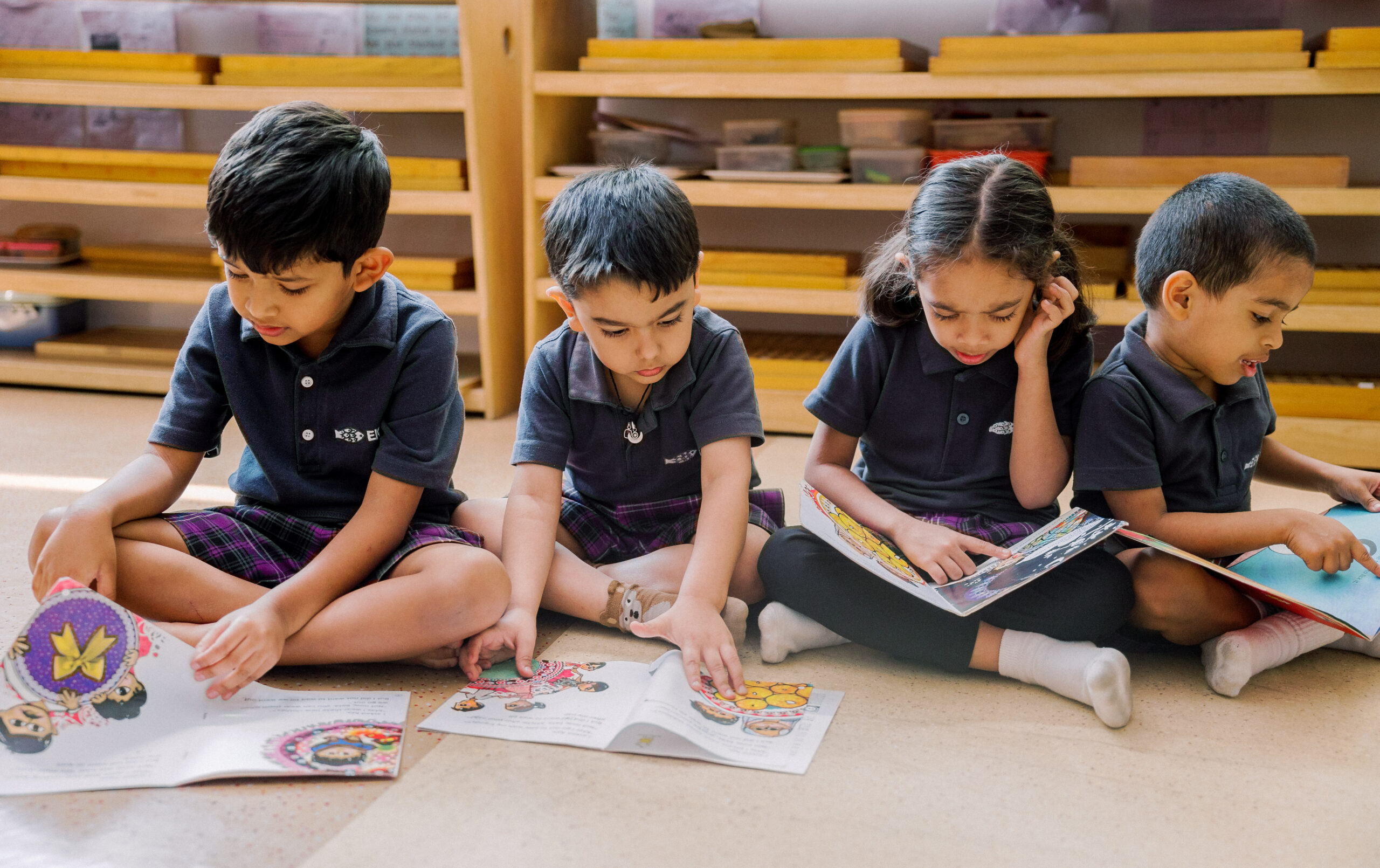
- Prewrite: Students generate ideas, choose a topic, and outline their approach.
- Research: Sources are identified, information is gathered, and findings are categorised.
- Draft: The next step is to write freely, review their work, and revise until satisfied.
- Revise: Then, paragraphs are reorganised, unclear language is replaced, and content is refined.
- Edit & Proofread: The final step involves reviewing formatting, grammar, and punctuation to ensure a polished product.
Language Tools
Ekya’s language program employs interactive techniques like Reader’s Theater and Author’s Chair to enhance literacy skills, foster creativity, and build community, making student thinking visible and deepening comprehension through peer collaboration.

- Reader’s Theater: Perform scripts to enhance reading fluency and comprehension.
- Reading Jigsaws: Read, summarise, and share sections of a text to piece together the full story.
- Author’s Chair: Share writing and receive feedback to build a supportive writing environment.
Humanities & Social Science

Learning Area Purpose
- Develop a deeper understanding of society, law, politics and human-environment interactions
- Critically think about issues and perspectives by recognising the different social, historical and legal contexts
- Make informed and reasoned decisions for the public good.
- Social Science (Grades 1-10): The Social Science program focuses on social science knowledge and understanding which are essential for informed citizenship and participation in a democratic society. The curriculum helps students build skills Like critical thinking and problem-solving skills. The curriculum is planned to promote cultural understanding and respect in order to appreciate the diversity of human experience.
- Economics (Grades 11-12): Economics, the study of production distribution, and consumption of goods and services, provides students with the tools to analyse and understand the economic forces that shape our world. We explore concepts such as market structures, economic systems, globalisation, and international trade, equipping students with the knowledge to navigate the complexities of the modern economy.
- Political Science (Grades 11-12): Political Science delves into the intricacies of power, governance, and political systems. We examine the foundations of democracy, the role of government institutions, and the dynamics of international relations. Through this exploration, students gain insights into the political landscape and develop the critical thinking skills necessary to engage in informed political discourse.
- Psychology(Grades 11-12): Psychology, the study of the human mind and behaviour provides students with a fascinating glimpse into the complexities of human thought, emotions, and motivations. We explore topics such as cognitive processes, social behaviour, personality development, and mental health, empowering students to understand themselves and others better.
- Legal Studies (Grades 11-12): Legal Studies introduces students to the principles of law, the legal system, and the role of law in society. We examine concepts such as constitutional law, criminal law, civil law, and international law, fostering an understanding of the legal framework that governs our world.
Key Learning Experiences
Real-World Learning Through Research
Ekya students engage in interdisciplinary research projects that connect classroom learning to practical and ethical issues in their communities and the world.
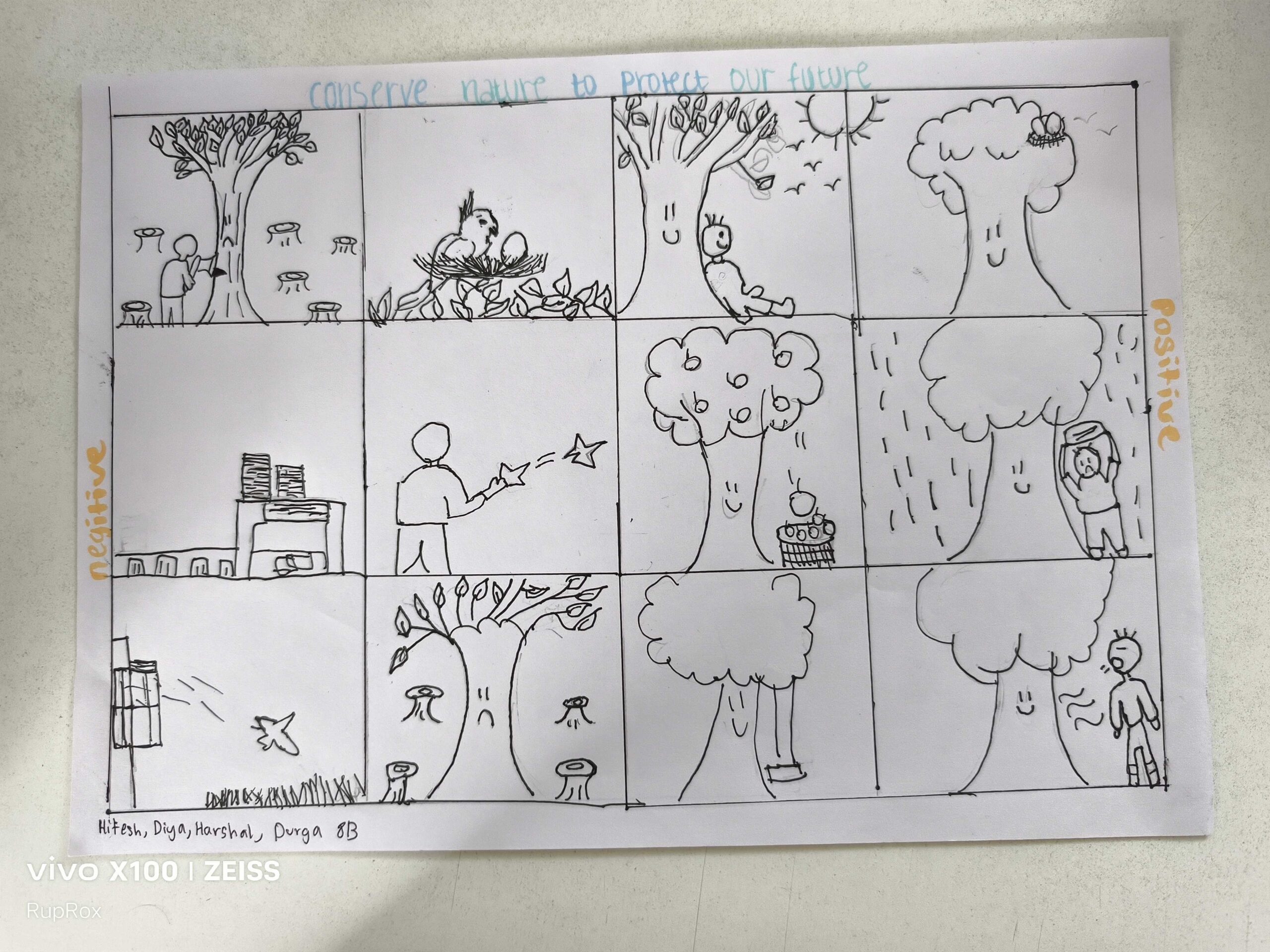
- Understanding socio-political realities through Ekya’s conceptual-based learning
- Developing research skills to analyse historical events and cultural practices
- Exploring geographical contexts and their impact on social structures
- Investigating the role of power and governance in shaping societies
- Applying theoretical frameworks to real-world case studies in Ekya’s social science curriculum
Activity-Based Learning
At Ekya, our social science curriculum is designed to be engaging and interactive, focusing on activity-based learning. Through hands-on experiences and real-world applications, students develop a deeper understanding of social science concepts.
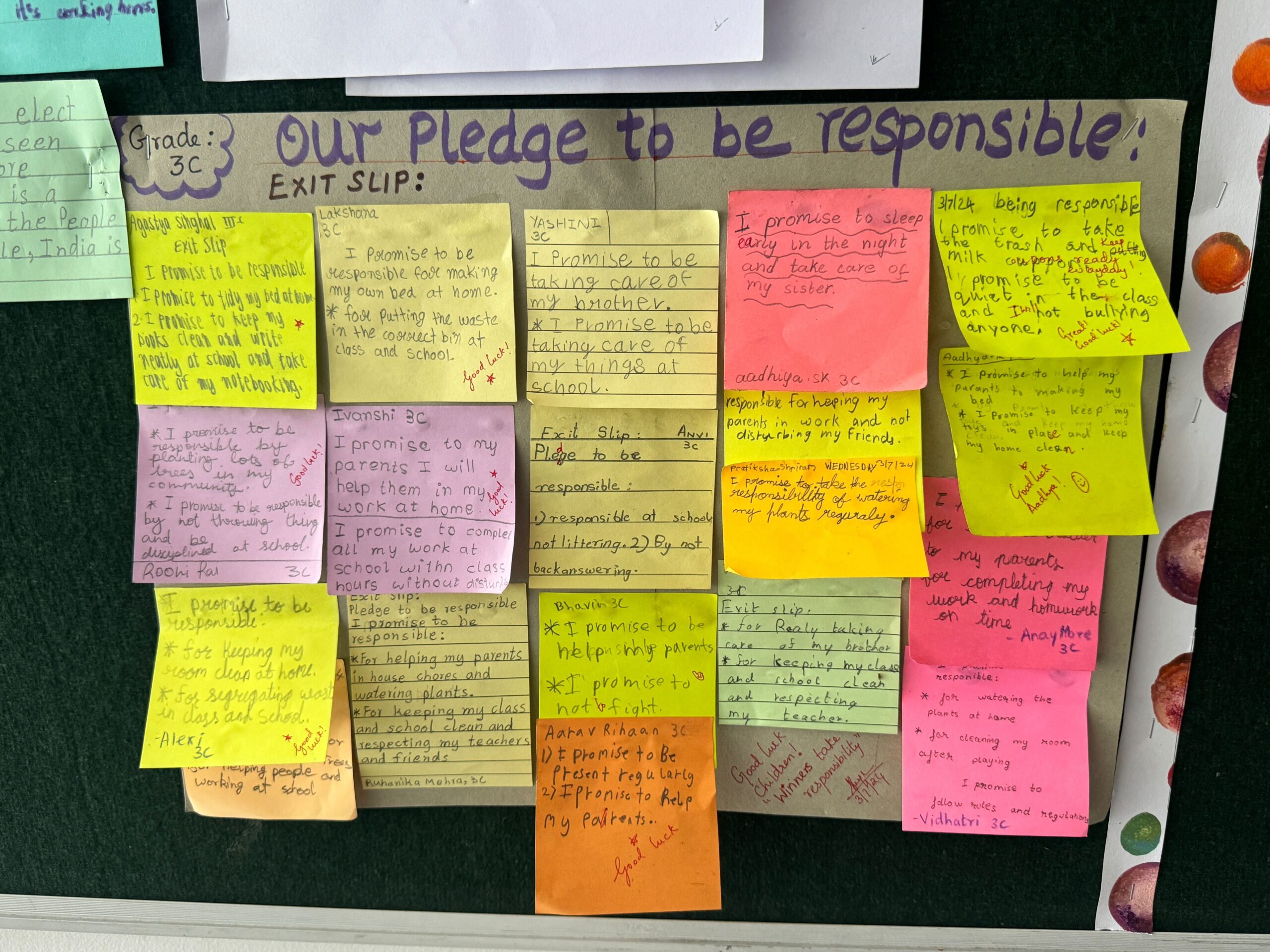
- Develops critical thinking and problem-solving skills through hands-on experiences
- Enhances understanding of social science concepts through experiential learning
- Meaningful activities facilitate exploration of geographical, historical, and cultural concepts
- Integrated themes and cross-cutting concepts foster connections between concepts, periods, and geographies
- Encourages adaptability and creativity through interactive learning experiences
Civic Action and Engagement
Ekya focuses on educating young minds and turning them into responsible citizens. The social science curriculum is heavily based on studying interaction and human behaviour in social, cultural, environmental, economic and political contexts.
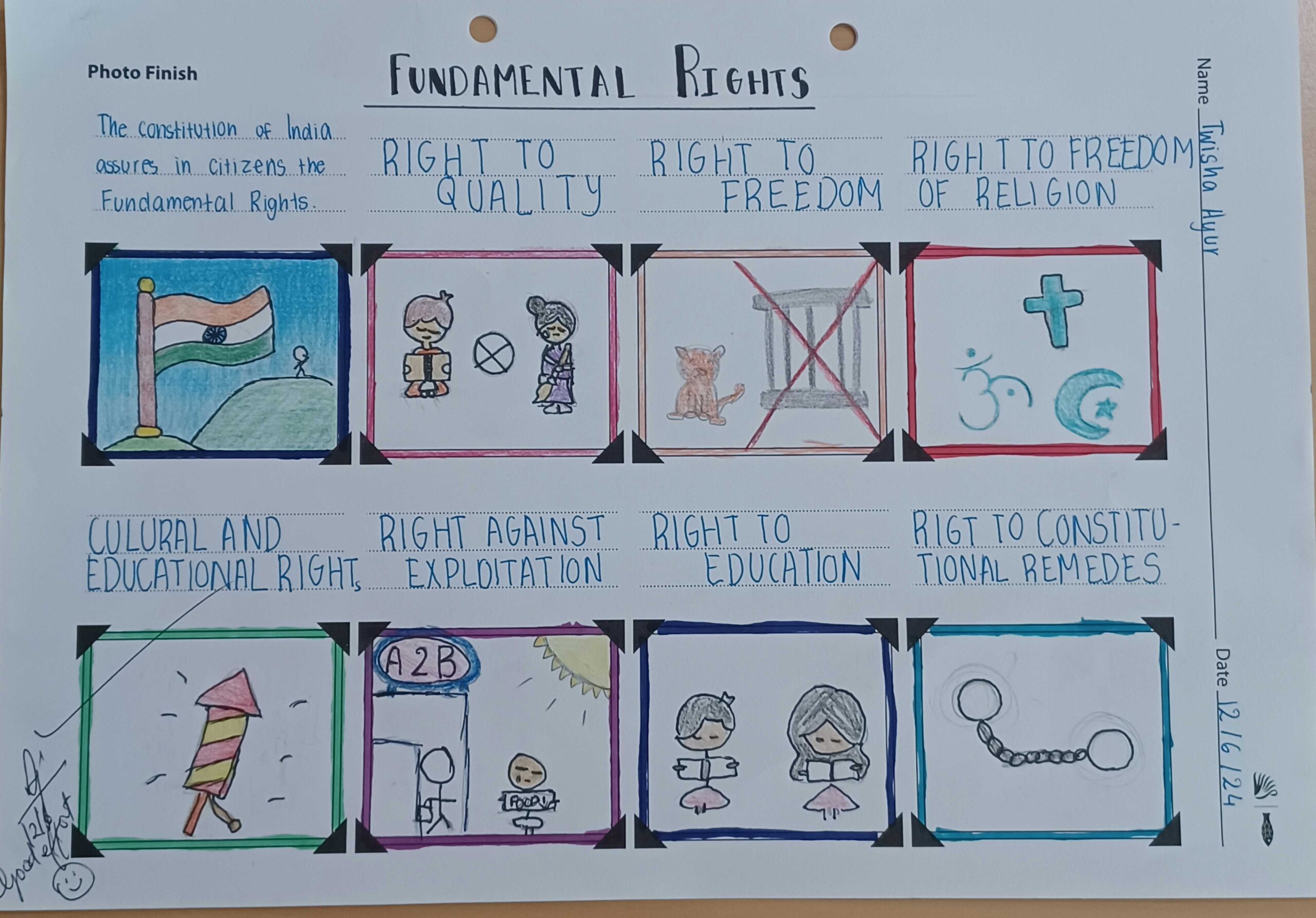
- Understanding the democratic process through experiential learning
- Making informed decisions for the public good through critical thinking and problem-solving
- Engaging in community and societal contributions through meaningful activities
- Our students examine complex social, economic, and political challenges
Social Science Tools in the Classroom
Ekya’s social science curriculum combines hands-on experiences and real-world applications to foster a deeper understanding of concepts, making learning engaging and interactive for students through activity-based learning.
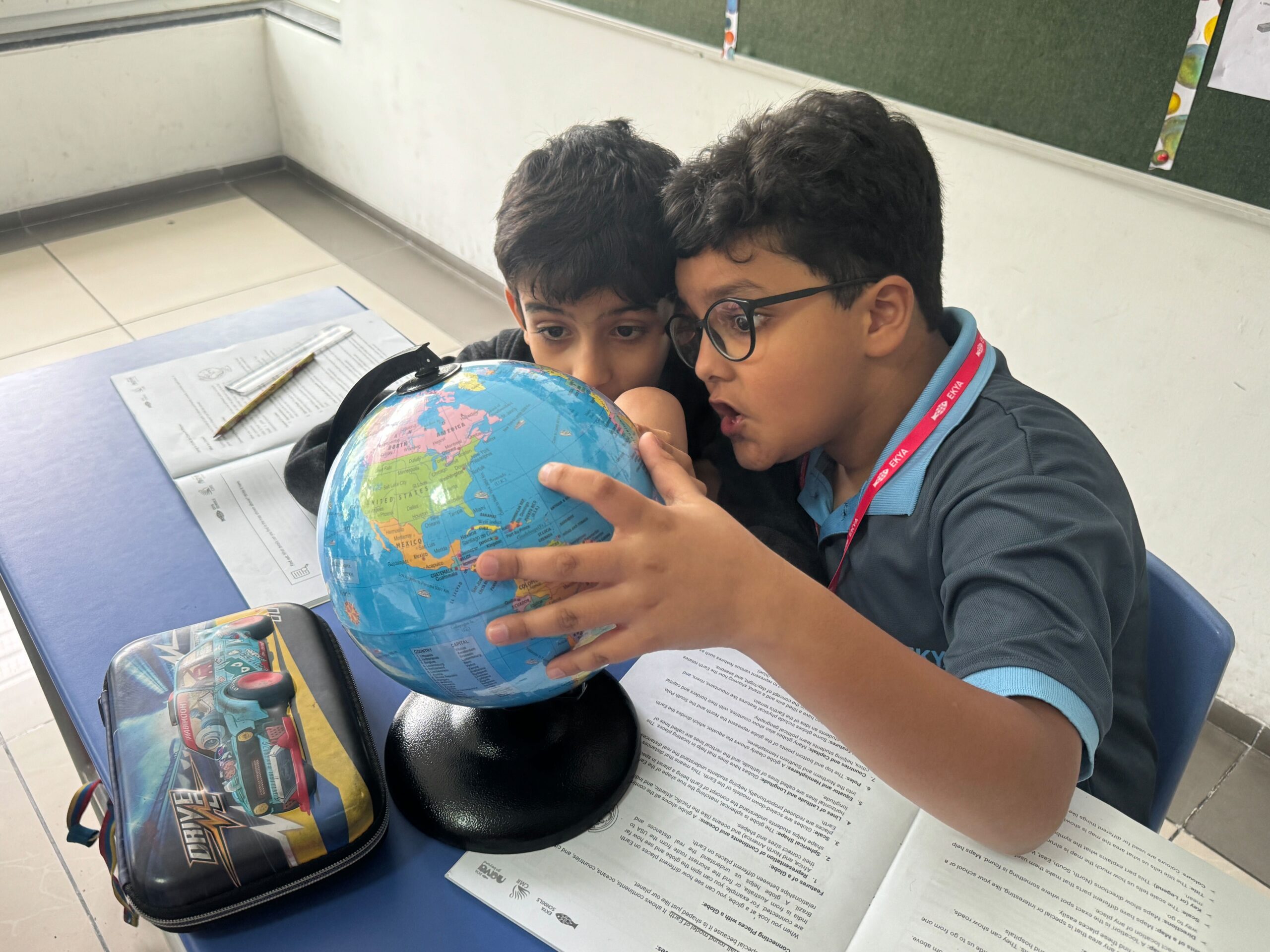
- Socratic Seminars: A method of teaching based on Socratic questioning, where students engage in deep, reflective discussions about a text or topic.
- Gallery Walks: Students create visual displays of their research or projects and walk around the classroom to view and discuss each other’s work.
- See Think Wonder: A thinking routine where students observe an image or artefact, describe what they see, think about what it means, and wonder about its implications.
- Round Table Discussions: Small group discussions where each participant has an equal opportunity to contribute, moderated to ensure focused and inclusive dialogue.

